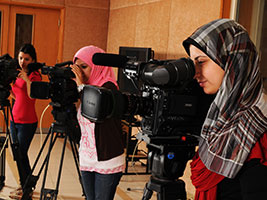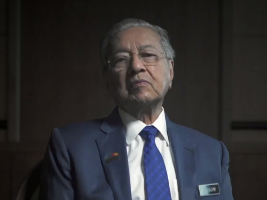What is communication and broadcasting all about?
by StudyMalaysia.com on July 30, 2018 | Top Stories, Career Guide

Are you interested in current affairs, entertainment and breaking news? Do you find it exciting to be actively involved with the production of news for radio, television or online media? Do you have good language skills, both written and spoken?
Communication and broadcasting focus on the delivery of timely and engaging news and information to the public or a specific audience.
Communication is concerned with the dissemination of news, information, entertainment and advertising through various media platforms including newspapers, magazines, new media, television, film and radio. Broadcasting is a branch of communication that uses video and audio content on a variety of platforms. Broadcasting companies create original content or buy the rights to broadcast local and national content, such as news, music programmes, talk shows, movies and advertisements.
People who work in this field have the power of speaking to millions of people simultaneously. From reporting sports and feature stories to crafting the written word, you will be able to reach out to readers, listeners and viewers all over the world.
What you will study
Most courses in this field will require students to start with an understanding the historical and contemporary developments across a broad range of media and communication sectors including press, radio, television, film, the Internet, multimedia, and mobile platforms.
You will also study key theories that will enable you to understand how various media and communication contribute to the construction of meaning, and how they shape modern societies.
You will then learn about the creation and production of media, the interrelated nature of media industries and the skills necessary to write, produce and distribute media messages. A well-rounded programme will allow you to explore a variety of areas including audio and video production, broadcast journalism, copywriting, and media management.
Many degree programmes include an internship component where students typically have the opportunity to gain hands-on experience working with television and radio production equipment, reading the news, working for a magazine, working for a public relations company, and more.
Is this course right for you?
- Do you have an inquisitive mind and a passion for storytelling?
- Are you creative, analytical and good with details?
- Do you have good language skills, both written and spoken?
- Can you work well under pressure and strict deadlines?
- Can you keep your cool in tense, stressful and hectic situations?
- Are you comfortable with gadgets and keeping up with the latest tech?
- Are you interested in the impact of mass media on a local and global scale?
- Would you like a job that is involved in informing, educating or entertaining people?
- Are you always the first to know about a piece of breaking news, whether it concerns fashion, technology, business, politics or entertainment?
- Would you like working for a magazine or newspaper, radio station or television network, publishing house, or an advertising or PR company?
If you answered yes to more than half of the questions above, you may want to consider a degree in communication and broadcasting.
Courses in communication and broadcasting
Courses in communication and broadcasting are offered at foundation, certificate, diploma, and bachelor degree level. Postgraduate study in this field is also offered at selected higher education institutions.
Career prospects
A variety of careers are available in communication and broadcasting and mass communications both on-air and behind the scenes. Jobs in communication are wide-ranging and include advertising & promotions manager, brand manager, copywriter, publicity manager, special events coordinator, reporter, editor, journalist, fundraiser, speech writer, lobbyist, researcher, and others.
Broadcasting careers are often available in the areas of production, news and technical operations. Job titles can include broadcast journalist, programme host, programme producer, entertainment reporter, videographer, video editor, camera operator, production assistant film director, and others.
Common skills needed whether you choose a career in communication or broadcasting:
- Public speaking skills
- Ability to write engaging content for different audiences
- Able to relate to a wide variety of people and audiences
- A flair for uUsing persuasive, vivid language to full effect
Sources:
Related Articles:
You May Also Be Interested In...
Technical and vocational education and training (TVET) in Malaysia
![Technical and vocational education and training (TVET) in Malaysia - StudyMalaysia.com]() Technical and Vocational Education and Training (TVET) includes formal...
Technical and Vocational Education and Training (TVET) includes formal...�So you wanna be a Medical Laboratory Technologist
![�So you wanna be a Medical Laboratory Technologist - StudyMalaysia.com]() Did you know that about 70% of all medical decisions are based on labo...
Did you know that about 70% of all medical decisions are based on labo...�Is a career in law right for you?
![�Is a career in law right for you? - StudyMalaysia.com]() Law is a popular choice of course for many students – but is a caree...
Law is a popular choice of course for many students – but is a caree...Study in Malaysia - Dr. Mahathir Mohamad
![Study in Malaysia - Dr. Mahathir Mohamad - StudyMalaysia.com]() Gain invaluable experience, explore countless opportunities, make life...
Gain invaluable experience, explore countless opportunities, make life...Reopening of University Campuses for 2021/2022 Starting From 15/9/2021
![Reopening of University Campuses for 2021/2022 Starting From 15/9/2021 - StudyMalaysia.com]() All universities in Malaysia, both public and private, are planning to...
All universities in Malaysia, both public and private, are planning to...Part 2: Study Abroad Pathway Course Directory: Pathway of acquiring a foreign degree qualification
![Part 2: Study Abroad Pathway Course Directory: Pathway of acquiring a foreign degree qualification - StudyMalaysia.com]() Home-grown Bachelor's Degree that have 'Advance Standing or ...
Home-grown Bachelor's Degree that have 'Advance Standing or ...



































